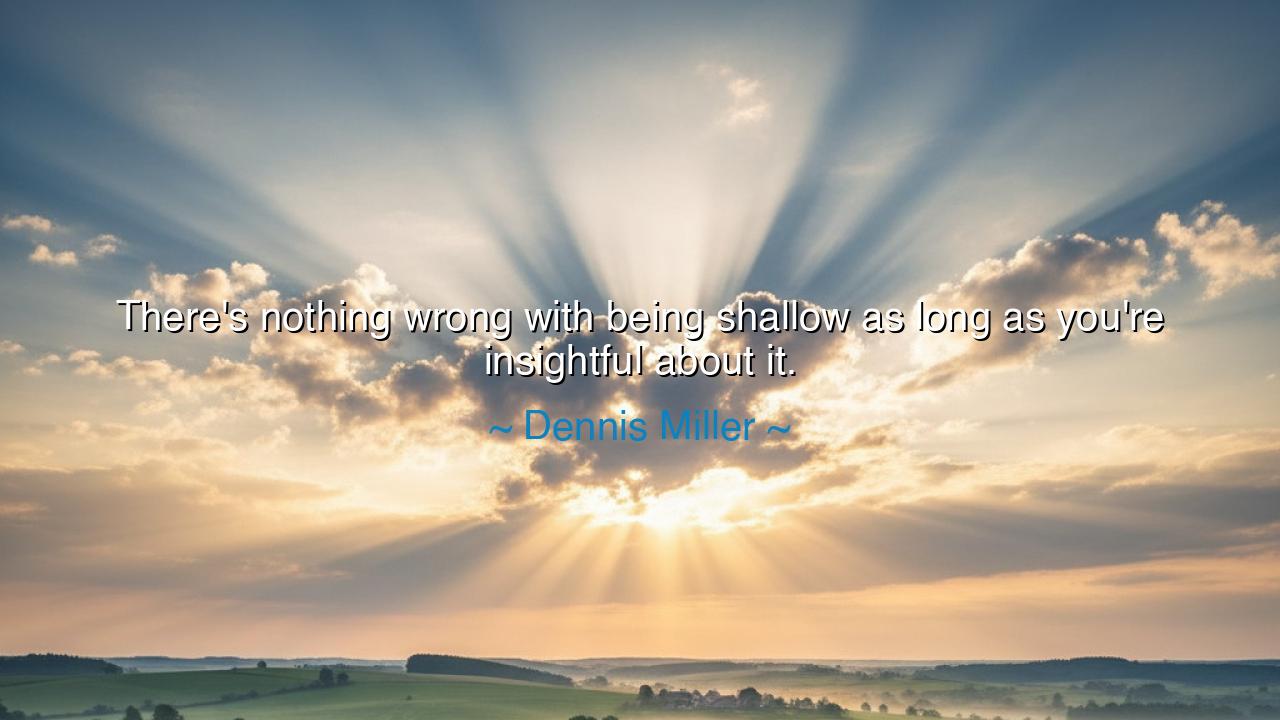
There's nothing wrong with being shallow as long as you're






“There’s nothing wrong with being shallow as long as you’re insightful about it.” — Dennis Miller
In this witty and paradoxical saying, Dennis Miller, the sharp-tongued philosopher of modern comedy, reveals a truth wrapped in irony — that self-awareness transforms even the trivial into wisdom. On the surface, the line sounds like a jest, a shrug in the face of depth and meaning. Yet beneath the humor lies a deeper reflection on authenticity and the value of knowing oneself. To be shallow, in the common tongue, is to dwell on surfaces — to care for appearances, fleeting pleasures, or the vanities of life. But Miller, in his clever inversion, tells us that even the shallow may possess insight, if they understand their own limitations. His words, like those of the jesters and philosophers of old, teach that wisdom is not always found in solemnity, but often in the laughter of those who see through their own absurdity.
For to be “insightful about one’s shallowness” is, paradoxically, to be deep. It is to stand before the mirror of the self and say, “Yes, I am human — vain, flawed, desirous — but I see it clearly.” The ancients taught that the greatest ignorance is not foolishness itself, but the illusion of wisdom. Socrates, that most ironic of sages, proclaimed, “I know that I know nothing.” Miller’s words echo this same spirit: he mocks human vanity by accepting it, by observing it with sharp humor and unflinching honesty. The shallow man who pretends to be profound is a fool; but the one who laughs at his own shallowness becomes, in that laughter, a philosopher.
The origin of this quote lies in Miller’s art — comedy that blends intelligence and satire. As a modern observer of culture, he saw a world obsessed with image, with noise, with fleeting attention. Yet rather than condemn it entirely, he found comedy in its contradictions. His jest suggests that awareness, even of one’s foolishness, redeems the folly. This was also the wisdom of the ancient Cynics, like Diogenes of Sinope, who lived in a barrel and mocked the pretensions of Athens. When people accused him of shamelessness, he replied, “Yes — but I am shameless in knowing it.” Miller’s line is born of that same lineage — the wit of those who unmask society’s pretenses by mocking their own.
There is a story told of Oscar Wilde, another master of irony, who once said, “It is only shallow people who do not judge by appearances.” Wilde, like Miller, knew that the distinction between shallow and profound is not fixed — it lies in awareness. The man who chases beauty, knowing it will fade, still understands transience; the one who pretends not to care for beauty at all merely lies to himself. Thus, to be “insightful about shallowness” is to recognize the play of the world — to dance with it rather than deny it. It is the art of living lightly, without pretense, without hypocrisy. It is the wisdom of the smile, not the sermon.
The ancients would have understood this balance. The Epicureans, seekers of pleasure and moderation, taught that joy need not be shameful if it is tempered by awareness. They saw life not as a tragedy, but as a feast — one to be enjoyed with grace and gratitude. In the same spirit, Miller’s words remind us that the world, though shallow at times, can still be meaningful if we meet it with clarity and humor. To mock our own vanity is to disarm it; to acknowledge our foolishness is to rise above it. The wise, after all, do not escape humanity — they embrace it fully, laughing as they learn.
Yet there is a warning in his jest as well. For Miller’s humor is edged with truth: the danger lies not in being shallow, but in being unaware of it. The one who worships appearances without reflection becomes hollow — a mask without a face. But the one who laughs at his own pretense remains alive. As the Stoics taught, awareness is the beginning of mastery. If you can name your weakness, it no longer rules you. If you can smile at your own vanity, it cannot consume you. This is what it means to be “insightful about being shallow” — to hold the mirror of truth with a grin, to see the folly of the world and yet remain kind to it.
So, my child, take this teaching to heart: do not be afraid of your flaws or of your lightness. The sin is not in being shallow — it is in refusing to look beneath your own surface. Laugh at yourself. Observe your vanities, your distractions, your need for praise — and in that laughter, you will find freedom. Be honest in your imperfections, for honesty itself is a form of depth. Do not seek to be endlessly solemn or profound, for such striving often breeds hypocrisy. Instead, live as Dennis Miller suggests: with wit, awareness, and the courage to see yourself as you are — both foolish and wise, fragile and strong.
For when you can look upon your own shallowness and smile, you have already transcended it. The sea, after all, may seem shallow at its edge, but it reflects the infinite sky.






AAdministratorAdministrator
Welcome, honored guests. Please leave a comment, we will respond soon